MNG00724 Human Resource Management - Strategic Job Analysis
VerifiedAdded on 2023/06/13
|6
|1390
|361
Essay
AI Summary
This essay provides a comprehensive analysis of job analysis, a critical function in Human Resource Management (HRM). It defines job analysis as the process of gathering information about a specific job or position, highlighting its role in understanding job roles, responsibilities, and implications within an organization's strategic management. The essay discusses the attributes associated with job analysis, including its connection to human resource strategies, job design, competency profiling, and its influence on recruitment, training, performance standards, and pay scales. It examines the operational and strategic importance of job analysis, noting its value in recruiting the right person for the right job and aligning job roles with strategic business decisions, while also addressing criticisms regarding its relevance in rapidly changing workplaces and its potential limitations in capturing cognitive capabilities. The essay concludes by acknowledging the ongoing debate about the relevance of job analysis, particularly in dynamic organizational environments, while affirming its importance for structured organizations seeking stability.
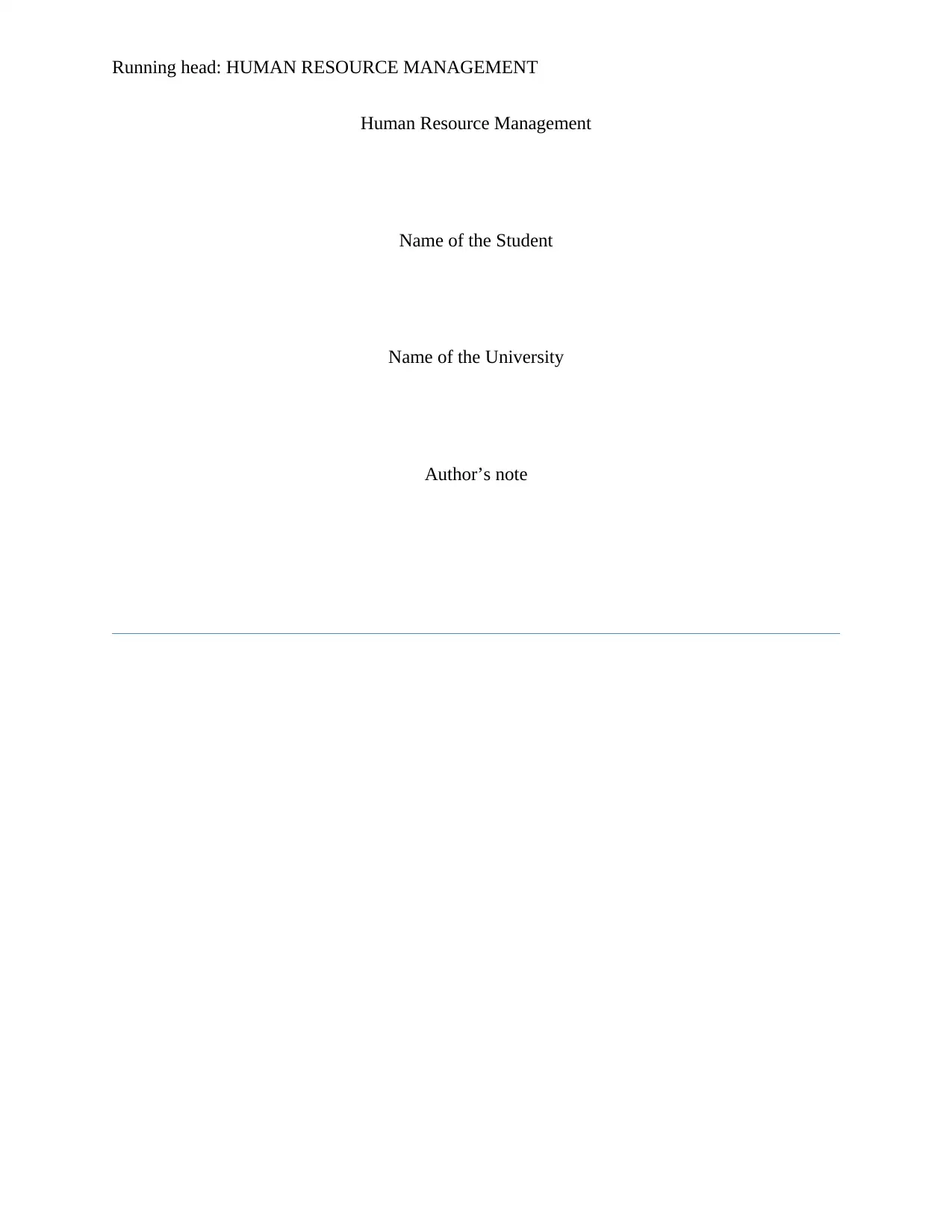
Running head: HUMAN RESOURCE MANAGEMENT
Human Resource Management
Name of the Student
Name of the University
Author’s note
Human Resource Management
Name of the Student
Name of the University
Author’s note
Paraphrase This Document
Need a fresh take? Get an instant paraphrase of this document with our AI Paraphraser
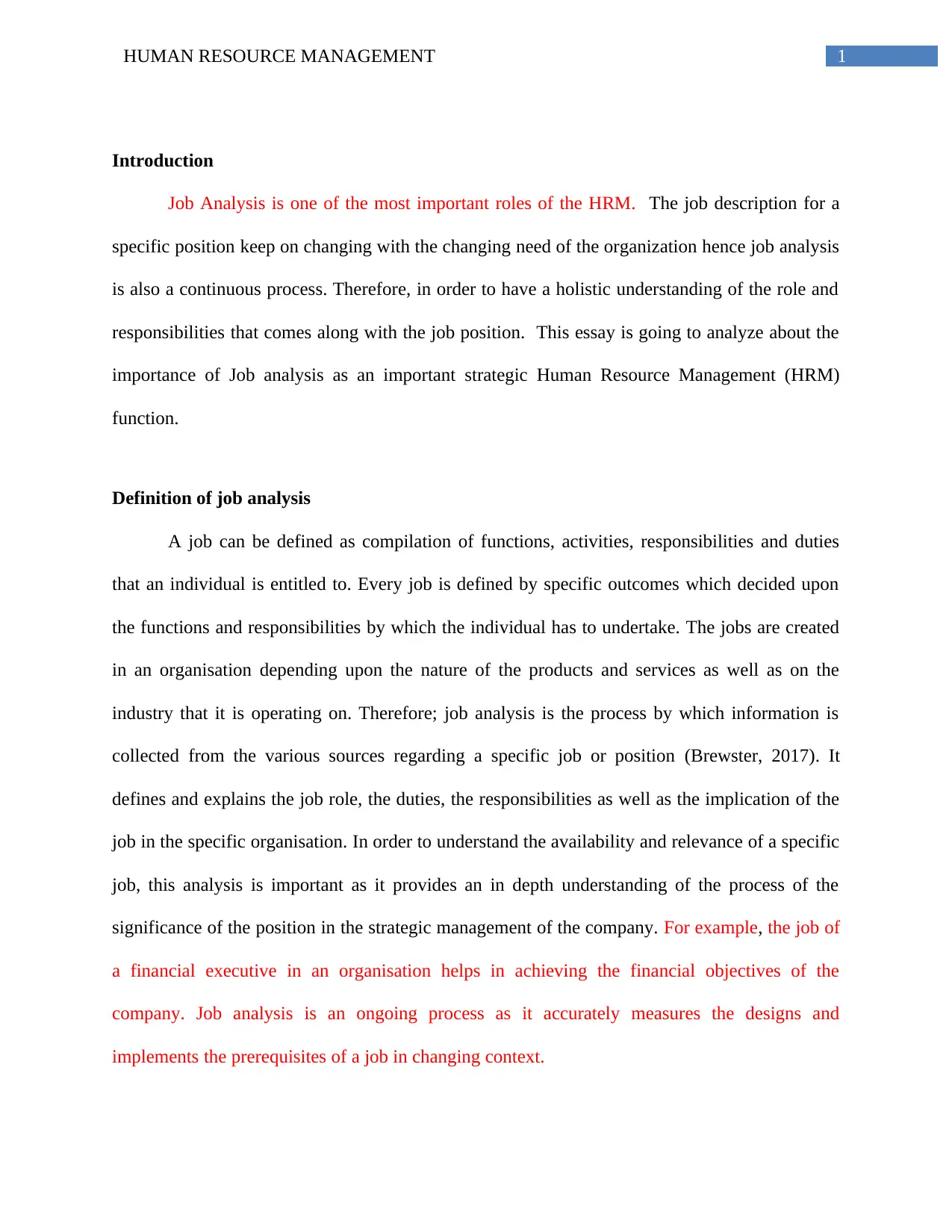
1HUMAN RESOURCE MANAGEMENT
Introduction
Job Analysis is one of the most important roles of the HRM. The job description for a
specific position keep on changing with the changing need of the organization hence job analysis
is also a continuous process. Therefore, in order to have a holistic understanding of the role and
responsibilities that comes along with the job position. This essay is going to analyze about the
importance of Job analysis as an important strategic Human Resource Management (HRM)
function.
Definition of job analysis
A job can be defined as compilation of functions, activities, responsibilities and duties
that an individual is entitled to. Every job is defined by specific outcomes which decided upon
the functions and responsibilities by which the individual has to undertake. The jobs are created
in an organisation depending upon the nature of the products and services as well as on the
industry that it is operating on. Therefore; job analysis is the process by which information is
collected from the various sources regarding a specific job or position (Brewster, 2017). It
defines and explains the job role, the duties, the responsibilities as well as the implication of the
job in the specific organisation. In order to understand the availability and relevance of a specific
job, this analysis is important as it provides an in depth understanding of the process of the
significance of the position in the strategic management of the company. For example, the job of
a financial executive in an organisation helps in achieving the financial objectives of the
company. Job analysis is an ongoing process as it accurately measures the designs and
implements the prerequisites of a job in changing context.
Introduction
Job Analysis is one of the most important roles of the HRM. The job description for a
specific position keep on changing with the changing need of the organization hence job analysis
is also a continuous process. Therefore, in order to have a holistic understanding of the role and
responsibilities that comes along with the job position. This essay is going to analyze about the
importance of Job analysis as an important strategic Human Resource Management (HRM)
function.
Definition of job analysis
A job can be defined as compilation of functions, activities, responsibilities and duties
that an individual is entitled to. Every job is defined by specific outcomes which decided upon
the functions and responsibilities by which the individual has to undertake. The jobs are created
in an organisation depending upon the nature of the products and services as well as on the
industry that it is operating on. Therefore; job analysis is the process by which information is
collected from the various sources regarding a specific job or position (Brewster, 2017). It
defines and explains the job role, the duties, the responsibilities as well as the implication of the
job in the specific organisation. In order to understand the availability and relevance of a specific
job, this analysis is important as it provides an in depth understanding of the process of the
significance of the position in the strategic management of the company. For example, the job of
a financial executive in an organisation helps in achieving the financial objectives of the
company. Job analysis is an ongoing process as it accurately measures the designs and
implements the prerequisites of a job in changing context.
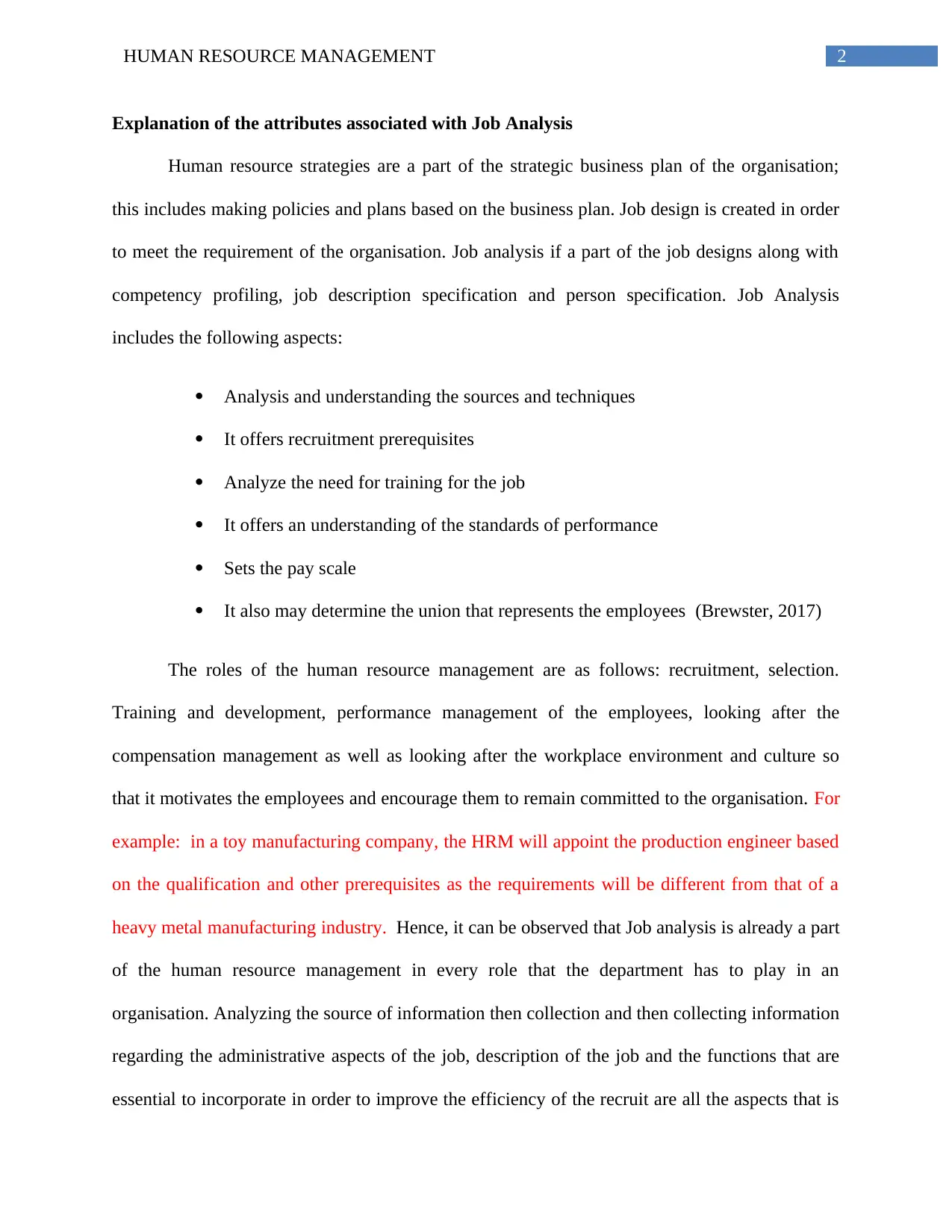
2HUMAN RESOURCE MANAGEMENT
Explanation of the attributes associated with Job Analysis
Human resource strategies are a part of the strategic business plan of the organisation;
this includes making policies and plans based on the business plan. Job design is created in order
to meet the requirement of the organisation. Job analysis if a part of the job designs along with
competency profiling, job description specification and person specification. Job Analysis
includes the following aspects:
Analysis and understanding the sources and techniques
It offers recruitment prerequisites
Analyze the need for training for the job
It offers an understanding of the standards of performance
Sets the pay scale
It also may determine the union that represents the employees (Brewster, 2017)
The roles of the human resource management are as follows: recruitment, selection.
Training and development, performance management of the employees, looking after the
compensation management as well as looking after the workplace environment and culture so
that it motivates the employees and encourage them to remain committed to the organisation. For
example: in a toy manufacturing company, the HRM will appoint the production engineer based
on the qualification and other prerequisites as the requirements will be different from that of a
heavy metal manufacturing industry. Hence, it can be observed that Job analysis is already a part
of the human resource management in every role that the department has to play in an
organisation. Analyzing the source of information then collection and then collecting information
regarding the administrative aspects of the job, description of the job and the functions that are
essential to incorporate in order to improve the efficiency of the recruit are all the aspects that is
Explanation of the attributes associated with Job Analysis
Human resource strategies are a part of the strategic business plan of the organisation;
this includes making policies and plans based on the business plan. Job design is created in order
to meet the requirement of the organisation. Job analysis if a part of the job designs along with
competency profiling, job description specification and person specification. Job Analysis
includes the following aspects:
Analysis and understanding the sources and techniques
It offers recruitment prerequisites
Analyze the need for training for the job
It offers an understanding of the standards of performance
Sets the pay scale
It also may determine the union that represents the employees (Brewster, 2017)
The roles of the human resource management are as follows: recruitment, selection.
Training and development, performance management of the employees, looking after the
compensation management as well as looking after the workplace environment and culture so
that it motivates the employees and encourage them to remain committed to the organisation. For
example: in a toy manufacturing company, the HRM will appoint the production engineer based
on the qualification and other prerequisites as the requirements will be different from that of a
heavy metal manufacturing industry. Hence, it can be observed that Job analysis is already a part
of the human resource management in every role that the department has to play in an
organisation. Analyzing the source of information then collection and then collecting information
regarding the administrative aspects of the job, description of the job and the functions that are
essential to incorporate in order to improve the efficiency of the recruit are all the aspects that is
⊘ This is a preview!⊘
Do you want full access?
Subscribe today to unlock all pages.

Trusted by 1+ million students worldwide
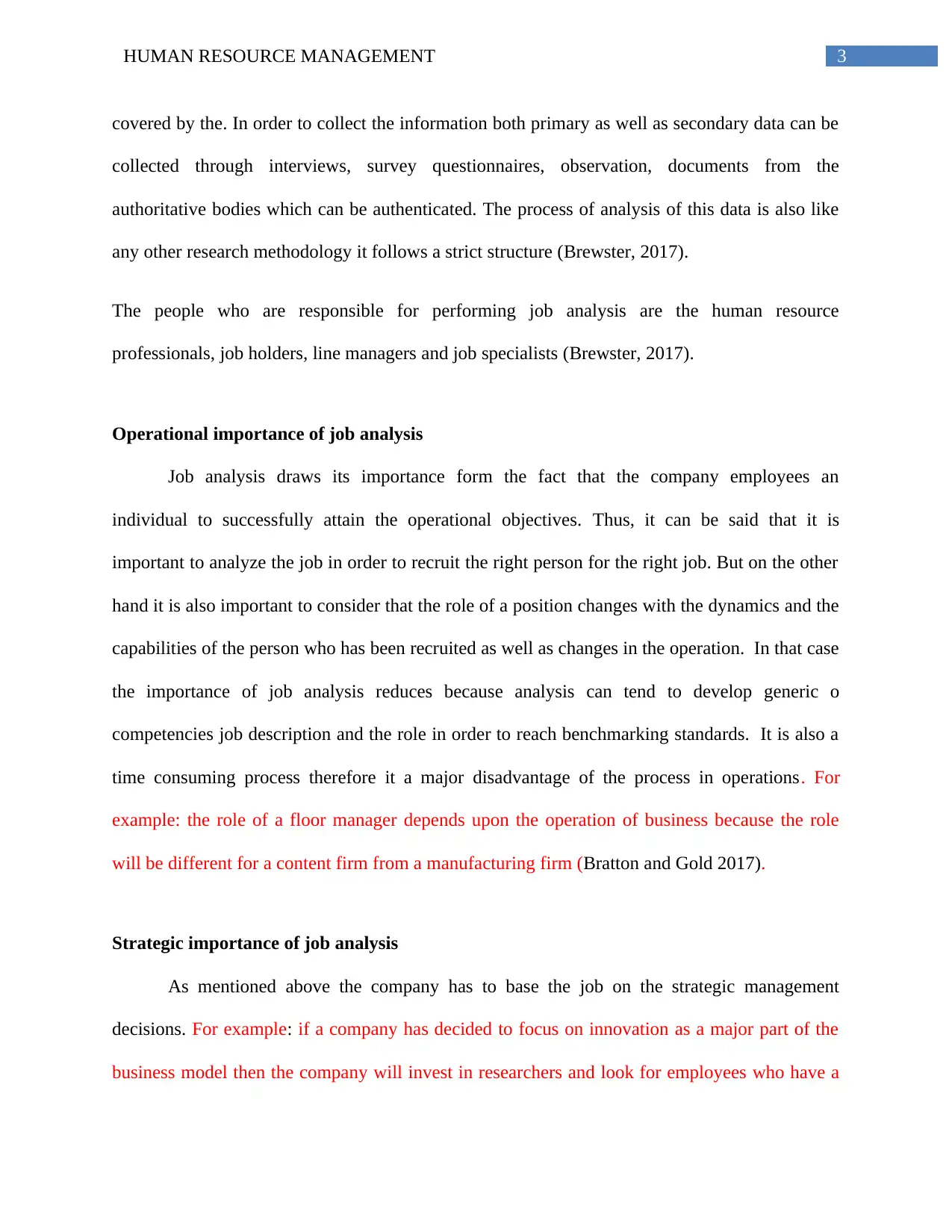
3HUMAN RESOURCE MANAGEMENT
covered by the. In order to collect the information both primary as well as secondary data can be
collected through interviews, survey questionnaires, observation, documents from the
authoritative bodies which can be authenticated. The process of analysis of this data is also like
any other research methodology it follows a strict structure (Brewster, 2017).
The people who are responsible for performing job analysis are the human resource
professionals, job holders, line managers and job specialists (Brewster, 2017).
Operational importance of job analysis
Job analysis draws its importance form the fact that the company employees an
individual to successfully attain the operational objectives. Thus, it can be said that it is
important to analyze the job in order to recruit the right person for the right job. But on the other
hand it is also important to consider that the role of a position changes with the dynamics and the
capabilities of the person who has been recruited as well as changes in the operation. In that case
the importance of job analysis reduces because analysis can tend to develop generic o
competencies job description and the role in order to reach benchmarking standards. It is also a
time consuming process therefore it a major disadvantage of the process in operations. For
example: the role of a floor manager depends upon the operation of business because the role
will be different for a content firm from a manufacturing firm (Bratton and Gold 2017).
Strategic importance of job analysis
As mentioned above the company has to base the job on the strategic management
decisions. For example: if a company has decided to focus on innovation as a major part of the
business model then the company will invest in researchers and look for employees who have a
covered by the. In order to collect the information both primary as well as secondary data can be
collected through interviews, survey questionnaires, observation, documents from the
authoritative bodies which can be authenticated. The process of analysis of this data is also like
any other research methodology it follows a strict structure (Brewster, 2017).
The people who are responsible for performing job analysis are the human resource
professionals, job holders, line managers and job specialists (Brewster, 2017).
Operational importance of job analysis
Job analysis draws its importance form the fact that the company employees an
individual to successfully attain the operational objectives. Thus, it can be said that it is
important to analyze the job in order to recruit the right person for the right job. But on the other
hand it is also important to consider that the role of a position changes with the dynamics and the
capabilities of the person who has been recruited as well as changes in the operation. In that case
the importance of job analysis reduces because analysis can tend to develop generic o
competencies job description and the role in order to reach benchmarking standards. It is also a
time consuming process therefore it a major disadvantage of the process in operations. For
example: the role of a floor manager depends upon the operation of business because the role
will be different for a content firm from a manufacturing firm (Bratton and Gold 2017).
Strategic importance of job analysis
As mentioned above the company has to base the job on the strategic management
decisions. For example: if a company has decided to focus on innovation as a major part of the
business model then the company will invest in researchers and look for employees who have a
Paraphrase This Document
Need a fresh take? Get an instant paraphrase of this document with our AI Paraphraser
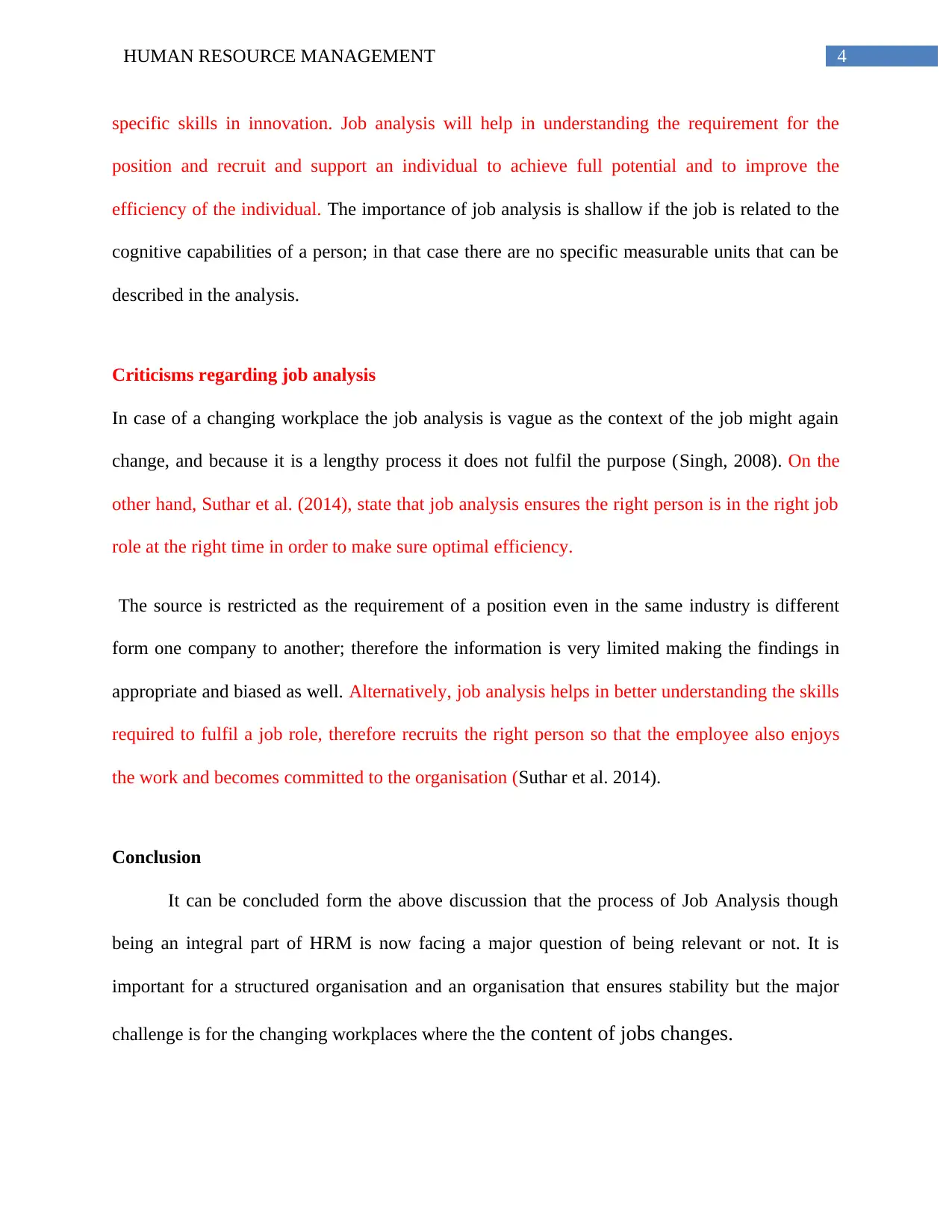
4HUMAN RESOURCE MANAGEMENT
specific skills in innovation. Job analysis will help in understanding the requirement for the
position and recruit and support an individual to achieve full potential and to improve the
efficiency of the individual. The importance of job analysis is shallow if the job is related to the
cognitive capabilities of a person; in that case there are no specific measurable units that can be
described in the analysis.
Criticisms regarding job analysis
In case of a changing workplace the job analysis is vague as the context of the job might again
change, and because it is a lengthy process it does not fulfil the purpose (Singh, 2008). On the
other hand, Suthar et al. (2014), state that job analysis ensures the right person is in the right job
role at the right time in order to make sure optimal efficiency.
The source is restricted as the requirement of a position even in the same industry is different
form one company to another; therefore the information is very limited making the findings in
appropriate and biased as well. Alternatively, job analysis helps in better understanding the skills
required to fulfil a job role, therefore recruits the right person so that the employee also enjoys
the work and becomes committed to the organisation (Suthar et al. 2014).
Conclusion
It can be concluded form the above discussion that the process of Job Analysis though
being an integral part of HRM is now facing a major question of being relevant or not. It is
important for a structured organisation and an organisation that ensures stability but the major
challenge is for the changing workplaces where the the content of jobs changes.
specific skills in innovation. Job analysis will help in understanding the requirement for the
position and recruit and support an individual to achieve full potential and to improve the
efficiency of the individual. The importance of job analysis is shallow if the job is related to the
cognitive capabilities of a person; in that case there are no specific measurable units that can be
described in the analysis.
Criticisms regarding job analysis
In case of a changing workplace the job analysis is vague as the context of the job might again
change, and because it is a lengthy process it does not fulfil the purpose (Singh, 2008). On the
other hand, Suthar et al. (2014), state that job analysis ensures the right person is in the right job
role at the right time in order to make sure optimal efficiency.
The source is restricted as the requirement of a position even in the same industry is different
form one company to another; therefore the information is very limited making the findings in
appropriate and biased as well. Alternatively, job analysis helps in better understanding the skills
required to fulfil a job role, therefore recruits the right person so that the employee also enjoys
the work and becomes committed to the organisation (Suthar et al. 2014).
Conclusion
It can be concluded form the above discussion that the process of Job Analysis though
being an integral part of HRM is now facing a major question of being relevant or not. It is
important for a structured organisation and an organisation that ensures stability but the major
challenge is for the changing workplaces where the the content of jobs changes.
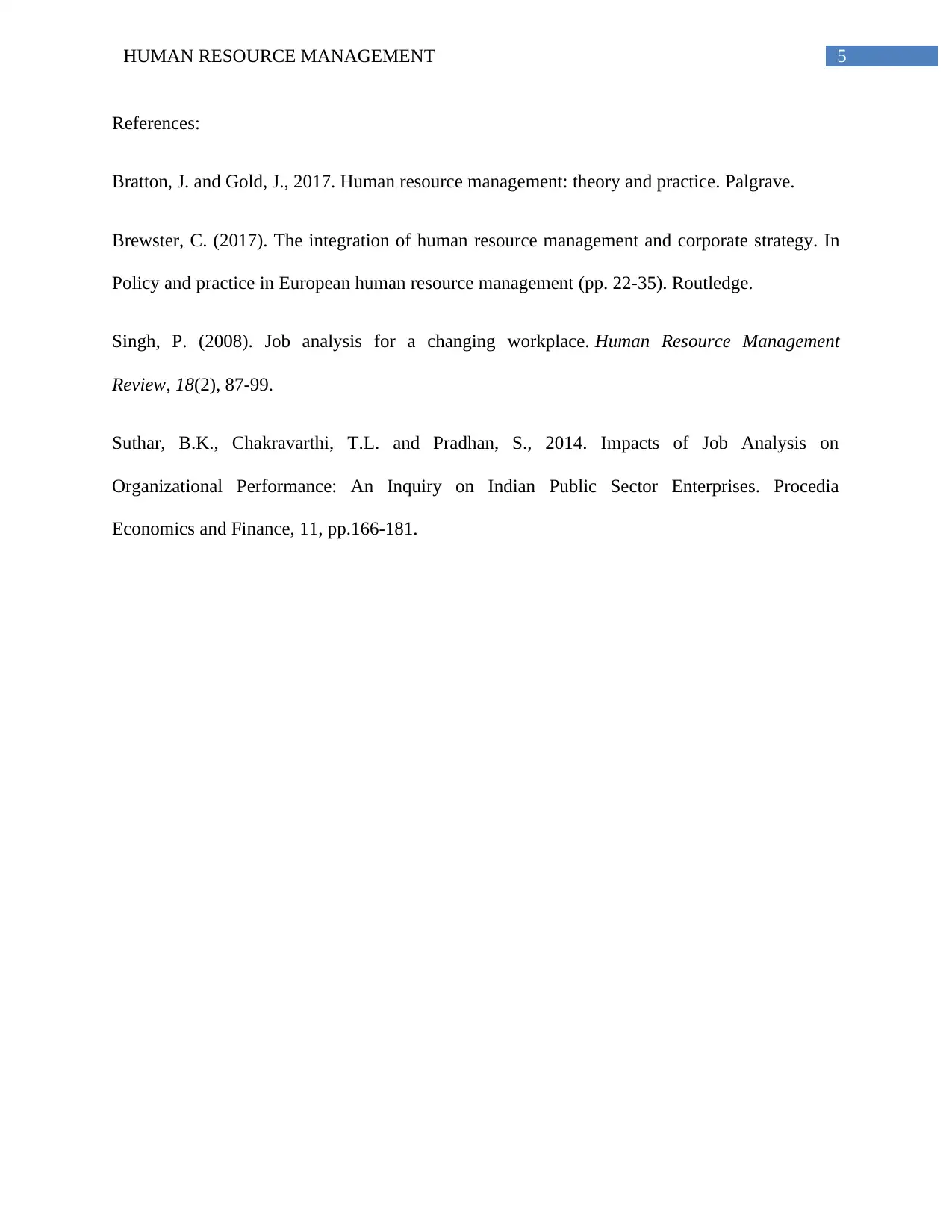
5HUMAN RESOURCE MANAGEMENT
References:
Bratton, J. and Gold, J., 2017. Human resource management: theory and practice. Palgrave.
Brewster, C. (2017). The integration of human resource management and corporate strategy. In
Policy and practice in European human resource management (pp. 22-35). Routledge.
Singh, P. (2008). Job analysis for a changing workplace. Human Resource Management
Review, 18(2), 87-99.
Suthar, B.K., Chakravarthi, T.L. and Pradhan, S., 2014. Impacts of Job Analysis on
Organizational Performance: An Inquiry on Indian Public Sector Enterprises. Procedia
Economics and Finance, 11, pp.166-181.
References:
Bratton, J. and Gold, J., 2017. Human resource management: theory and practice. Palgrave.
Brewster, C. (2017). The integration of human resource management and corporate strategy. In
Policy and practice in European human resource management (pp. 22-35). Routledge.
Singh, P. (2008). Job analysis for a changing workplace. Human Resource Management
Review, 18(2), 87-99.
Suthar, B.K., Chakravarthi, T.L. and Pradhan, S., 2014. Impacts of Job Analysis on
Organizational Performance: An Inquiry on Indian Public Sector Enterprises. Procedia
Economics and Finance, 11, pp.166-181.
⊘ This is a preview!⊘
Do you want full access?
Subscribe today to unlock all pages.

Trusted by 1+ million students worldwide
1 out of 6
Related Documents
Your All-in-One AI-Powered Toolkit for Academic Success.
+13062052269
info@desklib.com
Available 24*7 on WhatsApp / Email
![[object Object]](/_next/static/media/star-bottom.7253800d.svg)
Unlock your academic potential
Copyright © 2020–2025 A2Z Services. All Rights Reserved. Developed and managed by ZUCOL.



